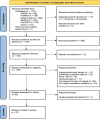Adolescent experiences of pregnancy in low-and middle-income countries: a meta-synthesis of qualitative studies
- PMID: 36096763
- PMCID: PMC9469636
- DOI: 10.1186/s12884-022-05022-1
Adolescent experiences of pregnancy in low-and middle-income countries: a meta-synthesis of qualitative studies
Abstract
Background: Fertility rates among adolescents have fallen globally, yet the greatest incidence remains in low-and middle-income countries (LMICs). Gaining insight into adolescents needs and experiences of pregnancy will help identify if context specific services meet their needs and how to optimise pregnancy experiences. A meta-synthesis of qualitative studies considering adolescent experiences of pregnancy in LMICs has not yet been published.
Aim: To synthesise available qualitative evidence to provide greater understanding of the needs and experiences of adolescents who become pregnant in low-and middle-income countries.
Methods: An extensive search utilised six databases and citations searching. Studies were included if they were of a qualitative or mixed methods design. Participants lived in LMICs and were adolescents who were pregnant, had experienced pregnancy during adolescence or were an adolescent male partner. Relevant studies were assessed for quality to determine suitability for inclusion. A meta-ethnography approach was used to generate themes and a final line of argument.
Results: After screening and quality assessment 21 studies were included. The meta-ethnography generated four themes, A wealth of emotions, I am not ready, Impactful relationships and Respectful and disrespectful care. Unplanned, unwanted and unacceptable pregnancies were a source of shame, with subsequent challenging personal relationships and frequently a lack of needed support. Even when pregnancy was wanted, adolescents faced the internal conflict of their desires not always aligning with socio-cultural, religious and family expectations. Access, utilisation and experiences of care were significantly impacted by adolescents' relationships with others, the level of respectful care experienced, and engagement with adolescent friendly services.
Conclusions: Adolescents who experience pregnancy in LMICs deserve support to meet their personal and pregnancy needs; efforts are needed to tailor the support provided. A lack of a health care provider knowledge and skills is an obstacle to optimal support, with more and better training integral to increasing the availability of adolescent friendly and respectful care. Adolescents should be involved in the planning of health care services and supported to make decisions about their care. The diversity across countries mean policy makers and other stakeholders need to consider how these implications can be realised in each context.
Keywords: Adolescent; Low-and middle-income countries; Meta-synthesis; Pregnancy.
© 2022. The Author(s).
Conflict of interest statement
The authors declare that they have no competing interests.
Figures
Similar articles
-
Why do women not use antenatal services in low- and middle-income countries? A meta-synthesis of qualitative studies.PLoS Med. 2013;10(1):e1001373. doi: 10.1371/journal.pmed.1001373. Epub 2013 Jan 22. PLoS Med. 2013. PMID: 23349622 Free PMC article.
-
Experiences of menstruation in high income countries: A systematic review, qualitative evidence synthesis and comparison to low- and middle-income countries.PLoS One. 2021 Jul 21;16(7):e0255001. doi: 10.1371/journal.pone.0255001. eCollection 2021. PLoS One. 2021. PMID: 34288971 Free PMC article.
-
Beyond the black stump: rapid reviews of health research issues affecting regional, rural and remote Australia.Med J Aust. 2020 Dec;213 Suppl 11:S3-S32.e1. doi: 10.5694/mja2.50881. Med J Aust. 2020. PMID: 33314144
-
Quality intrapartum care expectations and experiences of women in sub-Saharan African Low and Low Middle-Income Countries: a qualitative meta-synthesis.BMC Pregnancy Childbirth. 2023 Jan 14;23(1):27. doi: 10.1186/s12884-022-05319-1. BMC Pregnancy Childbirth. 2023. PMID: 36641424 Free PMC article. Review.
-
Adversities and mental health needs of pregnant adolescents in Kenya: identifying interpersonal, practical, and cultural barriers to care.BMC Womens Health. 2018 Jun 15;18(1):96. doi: 10.1186/s12905-018-0581-5. BMC Womens Health. 2018. PMID: 29902989 Free PMC article.
Cited by
-
Psychosocial Experiences of Pregnant Adolescent Girls: A Qualitative Phenomenological Study in a Rural District in Ghana.Inquiry. 2025 Jan-Dec;62:469580251325437. doi: 10.1177/00469580251325437. Epub 2025 Mar 12. Inquiry. 2025. PMID: 40071628 Free PMC article.
-
« Éloigne cette honte de moi! »: une étude qualitative des normes sociales entourant les expériences d’avortement chez les adolescentes et jeunes femmes au Bénin.Sex Reprod Health Matters. 2023;31(5):2294793. doi: 10.1080/26410397.2023.2294793. Epub 2024 May 10. Sex Reprod Health Matters. 2023. PMID: 38727684 Free PMC article. French.
-
The magnitude of teenage pregnancy and its associated factors among teenagers in Dodoma Tanzania: a community-based analytical cross-sectional study.Reprod Health. 2023 Feb 3;20(1):28. doi: 10.1186/s12978-022-01554-z. Reprod Health. 2023. PMID: 36737763 Free PMC article.
-
Effect of Digital applications on maternal as well as neonatal outcomes in Young pregnant girls: A Scope Review.Invest Educ Enferm. 2023 Nov;41(3):e07. doi: 10.17533/udea.iee.v41n3e07. Invest Educ Enferm. 2023. PMID: 38589307 Free PMC article. Review.
-
Urban-rural differences in caregivers' willingness to support adolescent girls' contraceptive use in Ghana: a comparative study.Contracept Reprod Med. 2025 Aug 8;10(1):46. doi: 10.1186/s40834-025-00370-7. Contracept Reprod Med. 2025. PMID: 40775672 Free PMC article.
References
-
- World Health Organization. Adolescent Pregnancy: World Health Organization; 2020 [Available from: https://www.who.int/news-room/fact-sheets/detail/adolescent-pregnancy.
-
- The World Bank. Adolescent fertility rate (births per 1,000 women ages 15–19) 2019 [Available from: https://data.worldbank.org/indicator/SP.ADO.TFRT.
-
- Presler-Marshall E, Jones N. Charting the future Empowering girls to prevent early pregnancy. London: Overseas Development Institute, Save the Children; 2012.
-
- UNFPA. Girlhood, Not Motherhood; Preventing Adolescent Pregnany. UNFPA; 2015.
MeSH terms
Grants and funding
LinkOut - more resources
Full Text Sources


